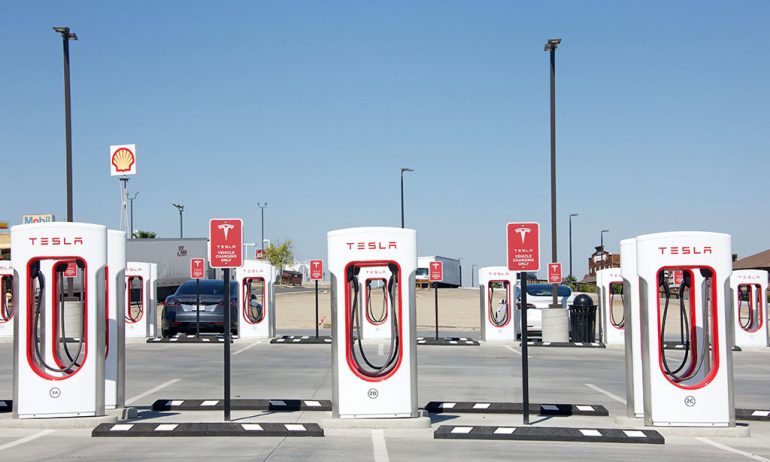
Ford Motor Co’s recent decision to allow its customers to use Tesla’s electric-vehicle charging network has sparked discussions and raised important questions within the U.S. EV charging industry. The deal, announced last month, will grant access to over 12,000 Tesla Superchargers to drivers of Ford vehicles in North America from 2024 onwards. This development has put pressure on other companies in the industry, as well as the administration of President Joe Biden, to either conform to this standard or invest more heavily in their own charging infrastructure.
The partnership between Ford and Tesla has significant implications. Industry executives, investors, bankers, and consultants assert that Tesla’s early entry into the electric vehicle charging space, combined with Ford’s endorsement, will necessitate a costly pivot for companies that have invested in alternative technologies. Paul Baiocchi, Chief ETF Strategist at SS&C ALPS Advisors, acknowledges that this will be an expensive proposition for these companies. SS&C has investments in charging companies such as ChargePoint Holdings Inc, EVgo Inc, and Blink Charging Co.
The deal between Ford and Tesla has bolstered Tesla’s North American Charging Standard (NACS), while undermining smaller players that offer the Combined Charging System (CCS). Tesla CEO Elon Musk hopes that this collaboration with Ford, the second-largest seller of EVs in the U.S., will help establish Tesla’s technology as the standard in North America. Consequently, other charging companies now face the challenge of upgrading their networks to be compatible with Tesla’s system. However, many of these companies struggle with customer service and lack the necessary funds to make such an investment.
Transportation Secretary Pete Buttigieg, in response to the Ford-Tesla deal, indicated that the administration will not favor one standard over another. He mentioned the possibility of convergence towards a single system in the future, with adapters facilitating cross-usage. Nevertheless, deals like the one between Tesla and Ford create uncertainty in the industry and present obstacles to investment, according to CharIn, a global association promoting CCS.
To promote the adoption of CCS, the U.S. government has allocated $7.5 billion in federal funds as part of President Biden’s climate change plan, which aims to convert 50% of new U.S. vehicle sales to EVs by 2030. The perceived inefficiency and occasional inoperability of the existing CCS charging infrastructure have hindered EV adoption, leading prospective buyers to worry about being stranded without a charging option.
Building and maintaining a charging network requires substantial capital investment, and with EVs comprising only 6% of new car sales in the U.S. last year, profitability in the charging sector remains a challenge. Most automakers have yet to establish their own charging networks. However, if more companies adopt Tesla as the industry standard, financial pressures may increase, potentially leading to further consolidation and acquisitions within the charging industry.
While the Biden administration has shown support for CCS, favored by automakers like Volkswagen, General Motors, and BMW, Tesla has adopted this standard in Europe under regulatory pressure and has gradually opened a portion of its U.S. network to vehicles using CCS to potentially qualify for subsidies. Consequently, Tesla’s dominant position is strengthened when other charging companies face complaints about software bugs or faulty charging hardware.
As part of the Ford-Tesla deal, Ford will provide Tesla adapters to its customers and equip future EVs with NACS starting in 2025. It remains unclear if these adapters will be available to customers of other automakers. Some companies have already made plans to adopt Tesla’s technology, but the absence of a national standard may create further complications, according to industry officials. Consumer Reports senior policy analyst Chris Harto suggests that the industry may be locked into coexisting with two separate charging standards for the foreseeable future.
As a result of this collaboration, it is anticipated that a standards war will persist for a decade or longer, as stated by FreeWire CEO Arcady Sosinov. However, Sosinov also proposes that if Tesla’s network becomes the predominant standard, the U.S. government should invest in it. The future of the U.S. EV charging industry remains uncertain, with the Ford-Tesla deal raising important questions and intensifying discussions about national standards and the viability of existing charging startups.
Source: Reuters

Mike Floyd is a finance executive by trade and a car enthusiast at heart. As a CFO with a keen eye for detail and strategy, Mike brings his analytical mindset to the automotive world, uncovering fresh insights and unique perspectives that go beyond the surface. His passion for cars—especially his favorite, the Porsche 911, fuels his contributions to Automotive Addicts, where he blends a love for performance and design with his professional precision. Whether he’s breaking down industry trends or spotlighting emerging innovations, Mike helps keep the site both sharp and forward-thinking.